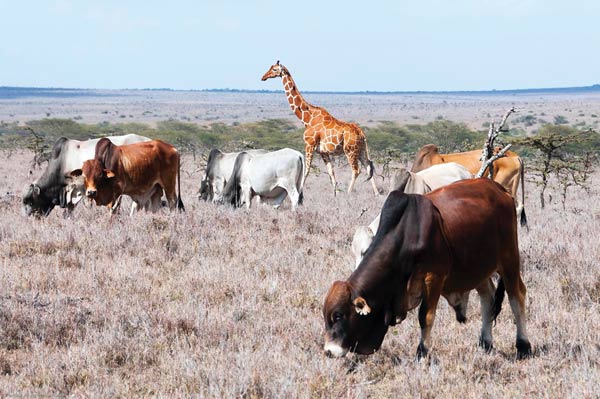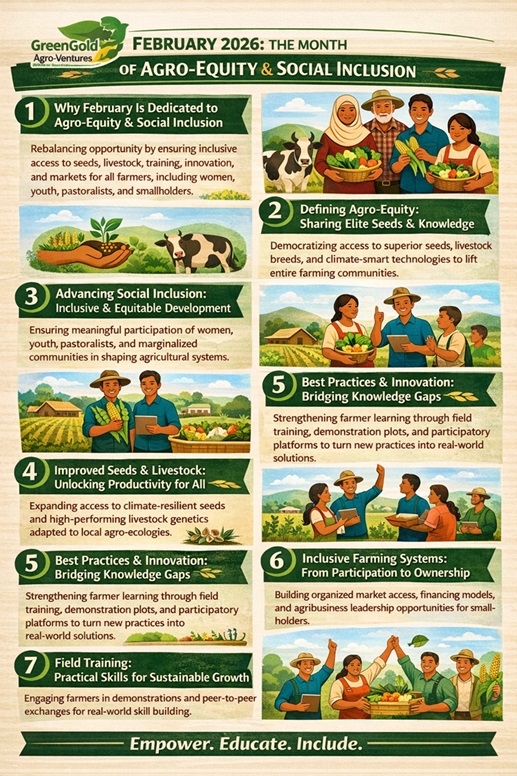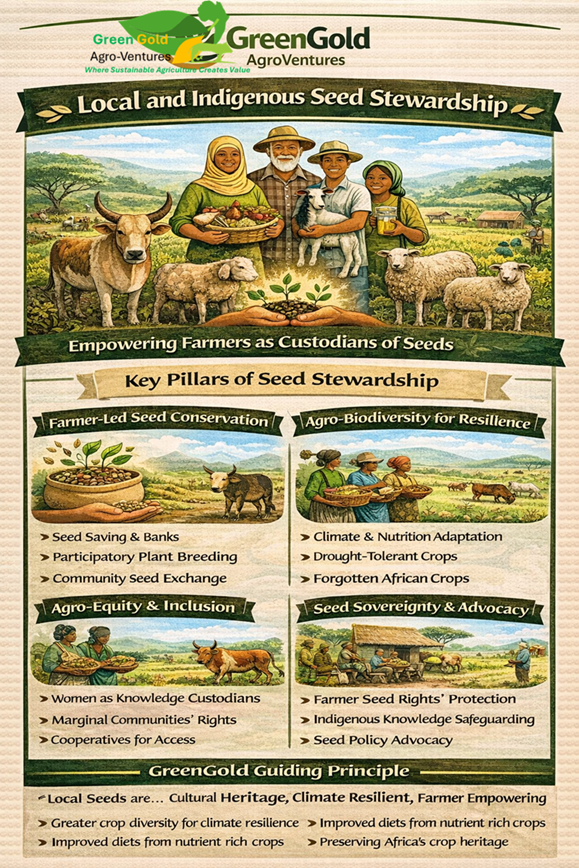From fragility to resilience, the African livestock revolution begins with the choices we make today

Livestock: The Beating Heart of Rural Africa – A New Vision for African Livestock
Across Africa, livestock is more than an economic sector, it is the beating heart of rural life. It feeds families, sustains cultures, empowers millions through livelihoods, and drives nearly 40% of agricultural GDP. Yet despite its centrality, livestock remains undervalued and underinvested. For hundreds of millions of Africans, animals are not merely assets, they are food, income, resilience, and identity. Cattle, goats, pigs, poultry, and camels sustain households, power local economies, and hold deep cultural meaning.
Still, the sector faces persistent challenges: low productivity, recurring disease outbreaks, high feed costs, and escalating climate pressures. Caught between traditional systems and modern demands, African livestock continues to operate below its potential. As climate change intensifies and populations surge, incremental progress will no longer suffice. What Africa needs is a transformative shift, a reimagining of livestock systems that are sustainable, innovative, and inclusive.
This transformation envisions livestock as a knowledge-based, climate-smart, and market-integrated sector, anchored in science, driven by technology, and inclusive of all farmers, especially vulnerable groups. It rests on eight interconnected pillars, brought to life through the complementary leadership of ILRI and AU-IBAR: ILRI advancing science, innovation, and data; and AU-IBAR driving policy leadership, coordination, and continental integration. Together, they can turn livestock into a dynamic engine of food security, climate resilience, and rural transformation across Africa.
1. Breeding for the future
Africa’s indigenous livestock breeds are renowned for their hardiness, adaptability, and deep-rooted cultural value. Yet, despite their resilience to heat, diseases, and feed scarcity, productivity remains low. The next frontier is to merge traditional resilience with modern science — harnessing genomics, data-driven selection, and community-based breeding to create high-performing, climate-resilient livestock that meet the continent’s growing demand for animal-source foods. The International Livestock Research Institute (ILRI) should spearhead genomic research, breed evaluation, and the development of open-access data platforms to accelerate the improvement of indigenous livestock. Through innovation in genomics and bioinformatics. On the other hand, the African Union Inter-African Bureau for Animal Resources (AU-IBAR) should coordinate continental breeding policies, harmonize frameworks for animal genetic resource management, and promote cross-country collaboration. ILRI can help unlock the genetic potential of local breeds while safeguarding biodiversity, while by providing policy coherence and facilitating regional breeding networks, AU-IBAR can ensure that indigenous livestock development becomes a shared African agenda — balancing productivity, resilience, and genetic sovereignty.
2. Feed innovation and circular solutions
Feed scarcity and high costs remain among the greatest barriers to profitable and sustainable livestock production in Africa. The overreliance on imported concentrates and fluctuating global commodity prices exposes farmers to volatility and limits competitiveness. Locally produced feeds, derived from climate-resilient forages, crop residues, insects, and agro-industrial by-products, offer a transformative pathway toward self-reliance and circular bioeconomy growth. Harnessing these resources can significantly lower production costs, reduce import dependence, and promote nutrient recycling across agricultural value chains. ILRI’s Role in this is to lead pan African research on climate-resilient forage varieties, optimize cost-effective and balanced feed formulations, and document scalable circular bioeconomy models that integrate livestock and crop systems, while AU-IBAR champions regional policies and quality assurance frameworks for feed production, harmonizes standards, and mobilizes investment in regional feed security initiatives that enable sustainable growth of the livestock sector.
3. Healthy animals, healthy economies
Animal diseases silently drain billions from Africa’s livestock sector each year, undermining productivity, trade, and rural livelihoods. From foot-and-mouth disease to African swine fever and zoonotic threats, the costs ripple far beyond the farm, threatening national economies and public health alike. Combating this requires more than reactive treatment; it demands a proactive, integrated, and technology-driven approach. Digital surveillance and rapid diagnostics are transforming disease management by enabling early detection, data-driven response, and cross-border traceability. Mobile platforms, GIS-based tracking, and AI-powered analytics can pinpoint emerging hotspots before outbreaks spiral out of control. Strengthened veterinary systems, equipped with modern laboratories, trained personnel, and efficient reporting channels, form the backbone of resilient livestock economies. As the continent’s premier livestock research institution, the International Livestock Research Institute (ILRI) should visibly demonstrate its central role in advancing vaccine development, innovative diagnostic tools, and One Health research, bridging animal, human, and environmental health. Its work on genomics, epidemiology, and surveillance should be rooted in countries’ academic and research agendas to strengthen Africa’s scientific foundation for disease prevention and control. The African Union–InterAfrican Bureau for Animal Resources (AU-IBAR) should reclaim its continental leadership role to transform science into action. By coordinating transboundary disease control programs, enhancing veterinary governance, and promoting harmonized biosecurity and emergency response frameworks among Member States, AU-IBAR ensures that national efforts align with regional and global standards. Together, ILRI and AU-IBAR can turn Africa’s vulnerability into strength, building a future where animal health security drives sustainable livestock development and resilient livelihoods.
4. Climate-Smart Livestock Systems
Livestock is part of Africa’s climate solution, not the problem. By integrating animals into regenerative landscapes through rotational grazing, silvopastoral systems, and manure-based bioenergy, farmers can restore degraded soils, enhance carbon sequestration, and reduce greenhouse gas emissions. Such systems transform livestock production into a driver of ecosystem restoration and rural resilience rather than a source of environmental strain. ILRI leads evidence generation on climate-smart livestock pathways, including life-cycle assessments, emissions baselines, and adaptation models that guide countries toward low-carbon, resilient livestock systems. That role should be strengthened and scaled to the continental level where AU-IBAR champions the integration of livestock into continental climate and biodiversity strategies, ensuring alignment with the African Union Climate Change and Resilient Development Strategy (2022–2032) and supporting Member States to translate policy commitments into action through harmonized frameworks and investment mechanisms.
5. Digital Transformation in Livestock Systems
Digital tools are transforming how Africa’s farmers breed, feed, and sell livestock. Mobile apps now connect producers directly to markets, sensors monitor animal health and movement, and AI-driven platforms optimize productivity and resource use. These innovations are creating smarter, more resilient livestock systems, enhancing traceability, reducing losses, and empowering data-driven decisions. ILRI plays a critical role by developing and piloting digital livestock platforms, precision management tools, and data analytics that serve both farmers and policymakers. Meanwhile, AU-IBAR leads the creation of continental data-sharing frameworks, harmonized digital standards, and interoperability policies that enable seamless information exchange and coordinated livestock development across Africa
6. Value Chains that Work for Farmers
Transforming production is not enough; Africa must also transform its markets. Rural Livestock Processing and Value Addition Hubs (RLPVAHs) can anchor regional economies and connect smallholders with processors and retailers, ensuring that value is created and retained locally. ILRI’s role is to map livestock value chains, identify leverage points for value addition, and support inclusive business models that empower producers and entrepreneurs. AU-IBAR’s role is to facilitate regional trade harmonization, certification standards, and investment frameworks that enable efficient, fair, and competitive livestock value chains across the continent.
7. Policy and Investment for Transformation
Transformation needs an enabling environment where governments align livestock development with national food security, climate resilience, and industrialization strategies while creating incentives for private sector participation through blended finance and risk-sharing mechanisms. ILRI should provide rigorous policy research, evidence-based insights, and impact evaluations to guide decision-making and monitor outcomes. Meanwhile, AU-IBAR should lead continental policy harmonization, strengthen institutional coordination among Member States, and steer the implementation of the Livestock Development Strategy for Africa (LiDeSA) to ensure coherence and accountability across the livestock sector.
8. Empowering social inclusion and equity
The future of livestock in Africa is inclusive, digital, and entrepreneurial. Across the continent, diverse actors, smallholders, pastoralists, cooperatives, and marginalized groups, are driving innovations in poultry, dairy, and livestock processing, proving that the sector can empower communities beyond traditional boundaries. With equitable access to finance, technology, and capacity development, livestock systems can become engines of social inclusion, decent employment, and sustainable economic transformation. The International Livestock Research Institute (ILRI) can advance this vision by partnering with incubators, universities, and innovation hubs to promote inclusive digital livestock entrepreneurship and applied research, nurturing a generation of socially responsive agritech innovators. The African Union Interafrican Bureau for Animal Resources (AU-IBAR) can reinforce these efforts by mainstreaming social inclusion and equity in livestock policies, harmonizing member state frameworks, and supporting continental networks that connect innovation, investment, and impact for all.
Catalyzing the Change
This transformation depends on three key enablers: investment, knowledge, and partnerships. Long-term, blended investment is needed to reward innovation and sustainability; robust knowledge systems must bridge science and practice through data-driven research; and dynamic partnerships should connect governments, researchers, farmers, and the private sector. Together, ILRI and AU-IBAR can drive this change, ILRI through science, innovation, and evidence generation, and AU-IBAR through policy leadership, institutional coordination, and continental integration.
From Vulnerability to Vitality
Africa’s livestock systems stand at a defining crossroads. One path leads to continued fragility and missed opportunities; the other to resilience, innovation, and shared prosperity. By harnessing science, technology, and inclusive growth, and by empowering institutions such as ILRI and AU-IBAR to lead, Africa can transform livestock into a cornerstone of sustainable development: feeding its people, powering its economies, and restoring its ecosystems. The livestock revolution begins with the choices we make today.
Related Posts

FEBRUARY 2026: The Month of Agro-Equity & Social Inclusion at GreenGold AgroVentures
Why February is dedicated to agro-equity & social inclusionFebruary 2026 marks a defining moment...
Read More →
Local and Indigenous Seed Stewardship: Empowering Farmers as Custodians of Our Food Future
At GreenGold AgroVentures, we believe that the future of African agriculture is deeply rooted in its...
Read More →